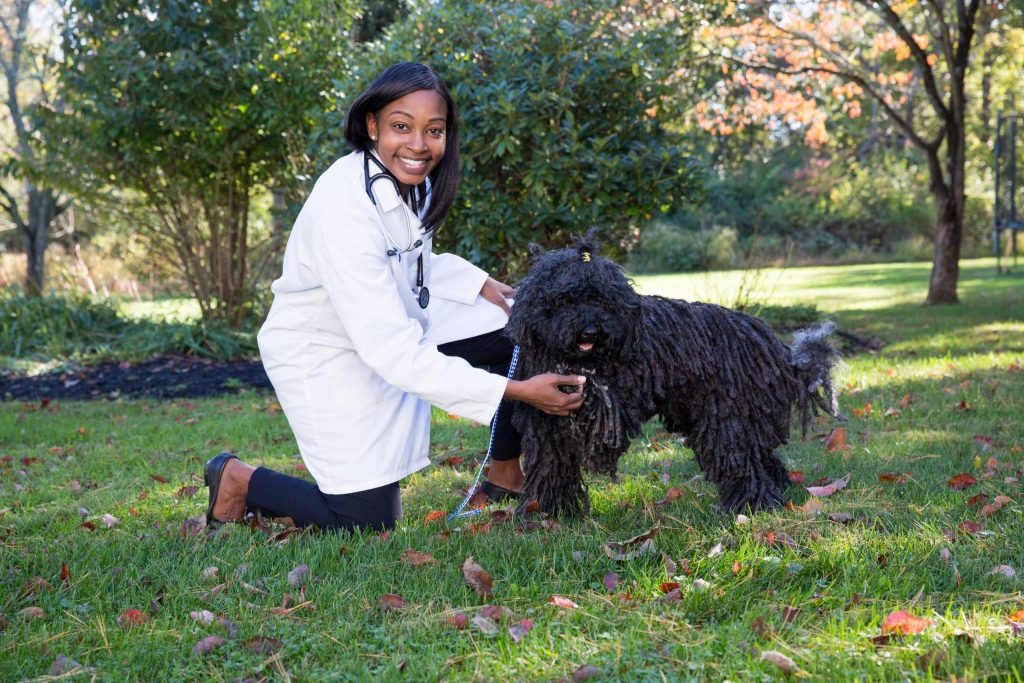Comprehensive Guide to the Providers Provided by a Vet Oncologist
Vet oncology includes a broad range of solutions aimed at diagnosing and dealing with cancer cells in pet dogs. Veterinary Cancer Specialist. Oncologists use innovative diagnostic strategies and use various therapy choices customized per pet's needs. They likewise focus on helpful care and give useful resources for family pet proprietors. Comprehending these services is necessary for making informed choices. What particular aspects of veterinary oncology can especially impact a family pet's treatment trip?
Comprehending Vet Oncology
Veterinary oncology is a specific field concentrated on diagnosing and dealing with cancer in animals. This discipline incorporates a large range of methods, from medical therapies such as chemotherapy and immunotherapy to surgical interventions focused on eliminating tumors. Vet oncologists are educated to identify the special symptoms of cancer cells in different types, enabling them to customize therapy plans to specific clients.
In addition to typical treatments, vet oncology emphasizes encouraging treatment, which plays a crucial duty in enhancing the quality of life for affected animals. This consists of discomfort monitoring, nutritional support, and palliative care alternatives. Collaboration with pet dog owners is vital, as they are essential to decision-making regarding their pet dogs' treatment paths. As research developments, vet oncology continues to progress, offering brand-new hope and boosted end results for pets diagnosed with cancer cells. On the whole, this area is basic for resolving the intricacies of cancer cells in buddy pets.
Advanced Diagnostic Techniques
Advanced diagnostic strategies play an essential role in vet oncology, giving critical insights right into the visibility and level of cancer in pets. Imaging methods such as ultrasound, CT scans, and MRI are typically employed to imagine lumps and analyze their qualities. Furthermore, biopsy treatments are necessary for getting cells examples, permitting clear-cut medical diagnosis and tailored therapy strategies.
Imaging Modalities Utilized
Imaging techniques play a necessary function in the medical diagnosis and monitoring of cancer cells in pets. Vet oncologists use various sophisticated imaging methods to analyze lump size, metastasis, and visibility. Radiography, or X-rays, offers an initial sight of bone and breast conditions, while ultrasound gives real-time imaging of soft cells, permitting in-depth examination of interior body organs. Computed tomography (CT) improves visualization of intricate anatomical structures and makes it possible for 3D reconstructions, assisting in specific tumor localization. Magnetic resonance imaging (MRI) is very useful for soft cells differentiation, particularly in mind growths. Furthermore, nuclear medicine methods such as positron emission tomography (ANIMAL) help determine metabolic task within lumps. Jointly, these methods enhance analysis accuracy, assisting effective treatment methods for oncological clients.
Biopsy Treatments Described
Adhering to the first assessment through imaging techniques, obtaining a clear-cut medical diagnosis commonly calls for tissue sampling through biopsy procedures. Vet oncologists use various biopsy strategies based on the tumor's place and characteristics. Fine needle ambition (FNA) is a minimally invasive method that removes cells for cytological evaluation, suitable for surface masses. Core needle biopsies provide larger tissue samples and serve for deeper tumors, permitting histopathological analysis. Surgical biopsies entail excising a portion or the entire lump, facilitating thorough analysis. These treatments not only confirm the presence of cancer cells yet additionally aid determine its type and grade, assisting treatment choices. Each biopsy approach is picked thoroughly to balance diagnostic precision with patient safety and convenience.
Therapy Choices for Cancer in Pet dogs
When a pet is detected with cancer cells, a selection of treatment alternatives appear to help handle the disease and improve lifestyle. Vet oncologists commonly recommend a multidisciplinary strategy tailored to the specific family pet's needs, which might include surgery, radiation treatment, immunotherapy, or alternate treatments.
Surgery is often used to get rid of tumors and affected tissues, potentially bring about full remission in many cases. Radiation therapy aims to damage and target cancer cells, minimizing tumor size and alleviating signs - Veterinary Cancer Specialist. Immunotherapy harnesses the pet's immune system to eliminate cancer extra effectively, while alternative therapies may include acupuncture or natural supplements to support general health and wellness
Each treatment choice brings its own benefits and dangers, and veterinary oncologists work closely with animal owners to develop a complete strategy that lines up with the family pet's certain medical diagnosis and the owner's wishes. The supreme goal is to boost the pet dog's convenience and top quality of life throughout their cancer cells journey.
Chemotherapy for Animals
Radiation treatment is an usual therapy option for animals diagnosed with cancer cells and is commonly utilized along with other treatments detailed by veterinary oncologists. This therapy entails the administration of specific medicines made to target and ruin cancer cells, thereby lowering growth size and protecting against the spread of the condition. Veterinary oncologists customize radiation treatment protocols based upon the sort of cancer, the pet dog's general health, and the wanted treatment end result.
Negative effects can occur, as these medications may additionally impact healthy and balanced cells. Typical responses include nausea, throwing up, and short-term adjustments in hunger - Board Certified Veterinary Oncologist. Vet oncologists are furnished to manage these adverse effects effectively, making sure the animal's convenience throughout the treatment process. Normal monitoring with blood examinations and follow-up visits is necessary to evaluate the pet dog's reaction to chemotherapy and make necessary modifications. Ultimately, radiation treatment can supply considerable advantages, enhancing the high quality of life for pet dogs facing cancer medical diagnoses

Radiation Treatment in Veterinary Medication
Radiation therapy acts as use this link an efficient therapy choice for pets detected with localized lumps, providing a targeted strategy to cancer monitoring. This method makes use of high-energy radiation to damage the DNA of cancer cells, hindering their capability to multiply. It is particularly valuable for tumors that are not responsive to surgical removal or for instances where surgical treatment might not be possible as a result of the tumor's place.
Vet oncologists tailor radiation procedures based on growth kind, area, and size, along with the pet's general wellness. Therapy can be delivered through exterior beam radiation or brachytherapy, each with distinct advantages. Commonly, multiple sessions are needed to make best use of effectiveness while reducing side impacts.
Animals might experience momentary responses such as skin irritation, the overall aim is to diminish lumps and reduce signs, inevitably enhancing the pet's diagnosis and high quality of life. As necessary, radiation treatment plays a crucial duty in thorough cancer cells treatment.
Palliative Treatment and High Quality of Life
Palliative care in veterinary oncology concentrates on enhancing the top quality of life for pet dogs encountering terminal diseases, guaranteeing comfort and dignity in their last days. This customized strategy focuses on pain management, signs and symptom control, and psychological support. Veterinary oncologists analyze each family pet's private needs, customizing treatments to minimize discomfort and boost general well-being.
Strategies may include carrying out medicines for discomfort alleviation, managing nausea or vomiting, and attending to other traumatic signs. Additionally, dietary support is often supplied to maintain toughness and improve cravings. The emotional facet of palliative care is just as crucial; creating a tranquil environment helps in reducing anxiousness for both animal and proprietor.
Ultimately, the objective of palliative care is to enable pets to enjoy their continuing to be time with as much delight and self-respect as possible. By concentrating on comfort and lifestyle, vet oncologists play a vital duty in guaranteeing that pet dogs and their families navigate this tough journey with empathy and understanding.
Assistance for Pet Owners During Therapy

Emotional Support for Owners
Charting the emotional landscape throughout a pet's cancer cells therapy can be an overwhelming experience for proprietors. The unpredictability bordering medical diagnosis and diagnosis can result in sensations of despair, helplessness, and stress and anxiety. Vet oncologists recognize the significance of psychological assistance and frequently supply advice to aid owners navigate this challenging journey. Interaction is crucial; discussing treatment options and prospective results can ease some anxieties. Additionally, offering reassurance that emotional reactions stand fosters a helpful atmosphere. Lots of oncology centers might likewise recommend assistance More Info groups or counseling services tailored for pet owners, helping with shared experiences. Encouraging owners to prioritize self-care throughout this moment is essential, as their psychological wellness straight influences their animal's comfort and overall therapy experience.

Resources and Educational Materials
Guiding with the complexities of a pet dog's cancer treatment can be frightening for owners, making access to academic materials and trusted sources important. Vet oncologists typically offer an array of handouts, pamphlets, and online materials that describe treatment choices, potential negative effects, and care approaches. These sources assist debunk the process and encourage family pet owners to make educated choices. Furthermore, several oncology centers supply access to sustain teams and online forums where proprietors can get in touch with others dealing with comparable challenges, promoting a feeling of community. Educational webinars and seminars conducted by veterinary specialists further improve understanding, making certain that owners are fully equipped to browse their animal's trip with cancer cells therapy with confidence and understanding.
Regularly Asked Inquiries
How Can I Prepare My Animal for a Vet Oncology Browse Through?
Preparing an animal for a veterinary oncology see entails gathering medical records, keeping in mind symptoms, and guaranteeing the family pet fits. A tranquil disposition and familiar products can assist alleviate anxiousness during the visit.
What Are the Indicators My Animal May Have Cancer Cells?
Indications that a pet dog may have cancer cells include unexplained weight loss, persistent vomiting or looseness of the bowels, unusual swellings or swellings, sleepiness, adjustments in cravings, trouble breathing, and alterations in actions. Motivate vet interest is essential.
Exactly How Can I Support My Animal Mentally During Therapy?
Supporting a family pet psychologically throughout treatment involves supplying comfort, keeping routines, using gentle affection, and making certain a calm atmosphere. Taking part in silent play and routine friendship assists relieve anxiety and promotes a sense of protection.
Exist Alternate Therapies for Family Pets With Cancer cells?
Alternate therapies for family pets with cancer cells include click this acupuncture, herbal treatments, and dietary assistance. These methods may enhance conventional therapies, promoting overall well-being. Consulting with a veterinarian is crucial for safe and reliable assimilation of different treatments.
What Costs Should I Anticipate for Vet Oncology Providers?
The expected prices for veterinary oncology solutions can vary significantly, typically influenced by diagnostics, treatments, and continuous care. Animal owners should get ready for expenses varying from appointments to specialized therapies, mirroring the intricacy of cancer monitoring.
Partnership with animal owners is important, as they are essential to decision-making concerning their pets' therapy paths. Each treatment choice carries its own advantages and threats, and veterinary oncologists work carefully with pet dog proprietors to design a comprehensive plan that lines up with the pet's details diagnosis and the owner's desires. Family pets may experience short-term responses such as skin inflammation, the total purpose is to shrink growths and minimize signs, ultimately boosting the pet's diagnosis and top quality of life. Assistance for pet dog proprietors during therapy is vital in steering via the emotional obstacles linked with a pet dog's cancer cells diagnosis. Preparing a pet for a veterinary oncology visit entails event clinical records, noting signs and symptoms, and making certain the animal is comfy.